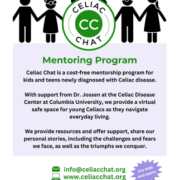Celiac Disease Research – The Good News Continues
 A potentially ‘revolutionary’ drug for celiac disease shows promise in phase 2 study.
A potentially ‘revolutionary’ drug for celiac disease shows promise in phase 2 study.
- David Wild, Gastroenterology & Endoscopy News 1
People with celiac disease may soon be able to have their gluten-rich cake and eat it, too.
In a phase 2 trial presented at the 2019 United European Gastroenterology Week, a first-of-its-kind drug significantly dampened the immune activation and reduced the intestinal damage that people with celiac disease experience in response to gluten.
- “If our findings are confirmed by subsequent studies, this treatment may represent a revolutionary change in how we manage celiac disease,” said Ciaran Kelly, MD, of Beth Israel Deaconess Medical Center, in Boston, who led the study (late-breaking abstract 18).
The IV-infused agent (TAK-101, Takeda Pharmaceutical) consists of gliadin-containing nanoparticles that diminish the immune activation that people with celiac disease experience, Dr. Kelly said.
The Study
- For the double-blind trial, Dr. Kelly and his colleagues administered two IV infusions, spaced one week apart, of either TAK-101 or placebo to 34 men and women with well-controlled celiac disease. “We wanted to determine the agent’s safety and efficacy in preventing immune activation and small intestinal mucosal injury,” he said.
- One week after the second infusion, patients started a two-week gluten challenge, eating 12 g of gluten daily for three days and 6 g daily for the next 11 days. Before treatment and at day 6 of the gluten challenge, researchers used an assay (ELISpot, Mabtech) to measure the number of interferon (IFN)-gamma spot-forming units as well as gut-homing CD4 and CD8 cells.
- They also performed endoscopies to measure the number of intestinal intraepithelial lymphocytes (IELs) and changes in the ratio of height-to-crypt depth of villi, which represents the extent of mucosal injury to the intestines after consumption of gluten.
- Six patients withdrew from the trial after developing symptoms associated with gluten. Among the 28 participants who completed the study, placebo recipients had a significant gliadin-induced immune response with gluten consumption, whereas those who received TAK-101 did not, Dr. Kelly reported.
- The number of IFN-gamma spot-forming units on ELISpot increased by a mean of 2.1 among TAK-101 recipients, compared with a mean increase of 17.6 among placebo recipients (P=0.0056). Also, the number of CD4 and CD8 cells increased significantly relative to baseline following gluten challenge among placebo recipients, but not among treatment recipients, Dr. Kelly noted.
- Gluten challenge triggered a mean increase in IELs of 28.6 per 100 epithelial cells among patients who received TAK-101, compared with a mean increase of 35 IELs per 100 epithelial cells among placebo recipients, according to the researchers.
Observations
- Dr. Kelly said participants who received the treatment showed a mean reduction of 0.18 in villus height-to-crypt depth ratio from baseline, in contrast to a 0.63 drop in this ratio among placebo participants, indicating less mucosal injury among TAK-101 recipients following gluten challenge.
Adverse events that were more common with TAK-101 were nausea, headache, abdominal pain and back pain, although most were mild and transient, Dr. Kelly said.
“TAK-101 gliadin nanoparticles represent a novel approach to induce tolerance to gluten in celiac disease, which is the central pathophysiologic event in celiac disease,” Dr. Kelly reported.
While more research is needed to demonstrate the agent’s efficacy, the study offers an
- “important proof of concept that tolerization to gluten is a path worth pursuing in celiac disease,” however,“whether such an approach would allow for a full gluten-containing diet, or only a degree of gluten, is unknown. The study was limited by its small size, allowing only for a measurement of inflammation as the outcome of focus. But the signal was strong enough to justify a larger study of this medication,” said Benjamin Lebwohl, MD, MS, the director of clinical research at the Celiac Disease Center at Columbia University, in New York City, who was not involved in the study.













